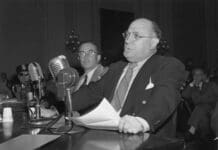When it comes to America’s latest “history war,” one of the biggest consequences is that it has made many K-12 educators scared and confused about what they can and can’t say in their classrooms.
Since 2021, at least 28 states have adopted measures that restrict how teachers can teach the history of racism in the U.S. Many more states have proposals on the table. The laws have been portrayed in the media as measures that would prevent teachers from teaching “divisive concepts” or lessons that would cause “discomfort, anguish or guilt.”
As a historian who studies some of the most brutal aspects of American history – from anti-Black lynching in the South after the Civil War to the use of torture during the war on terror – I don’t believe teachers have as much to worry about as many may think. Some observers have posited that the wave of new education laws will have a chilling effect on how history is taught. But a close look at these laws shows that they are generally written so broadly that they can’t effectively stop teachers from teaching history in a way that’s fair, accurate and true.
I’m not the first to make this point. For instance, one media critic has noted that coverage of the laws has “focused more on educators’ perceptions of and emotions about the legislation than on the actual language.” A law professor has argued that the mainstream media “distorts reality by mischaracterizing the laws” as bans against critical race theory, or CRT. Critical race theory is a concept that holds that racism is not just something that takes place among individuals, but rather has been embedded in American law and policy.
Some, such as law professor Jonathan Feingold, go so far as to say most of the laws actually call for more CRT, not less. I wouldn’t go that far. However, I do see a lot of leeway and loopholes in the laws. Here, I offer several examples of ways teachers can introduce difficult subjects that involve racism in the U.S. without violating the new laws that govern how teachers can discuss it.
In teaching about the history of American free markets, teachers would be justified to point out that slavery – and the associated industries of cotton and tobacco, to name just two – were all major components of the economy before the Civil War.
To make this more relatable to children, teachers could discuss something that every child understands: food and hunger. Historical records reveal that slaveholders cut costs by underfeeding enslaved children. They often did this until the children were old enough to become productive laborers. Slave owners also published extensive advice on how to reward and punish the people they had enslaved. Teachers can point out that for all the prowess of America’s free market, before the Civil War, that free market was largely dependent on the violence and forced labor that slavery involved.
Considerable debate has taken place as of late over whether students should be required to say the Pledge of Allegiance – a daily school ritual that ends with the reciting of the words “and liberty and justice for all.”
Since liberty has been a long-standing pillar of American society, no teacher could be faulted for having students examine if and how the nation historically has lived up to the notion that liberty had truly been secured “for all.”
For instance, when Patrick Henry reportedly exhorted his fellow Virginians “Give me liberty, or give me death!” in an effort to persuade them to declare independence from Great Britain, he was himself a slaveholder. So were most of the signers of the Declaration of Independence, which famously describes liberty as an “inalienable” God-given right.
Teachers could also examine the starkly different visions of liberty that developed over time. For instance, students could compare and contrast the visions of liberty espoused by Confederates in relation to the views held by President Abraham Lincoln and other Unionists.
In an effort to encourage patriotism, the “Stop Woke” law in Florida – adopted in 2022 – requires teachers to educate students about the sacrifices that veterans and Medal of Honor recipients have made for democracy. This serves as a great reason to teach about formerly enslaved men – including those who were awarded the Medal of Honor – who joined the Union army and helped defeat the Confederacy.
By studying these men and the reason they received these medals, students will learn the role that Black people themselves played in the abolition of slavery – the largest expansion of liberty in American history.
Given the current political climate in the U.S., there is no reason to assume more laws that govern what can be taught in public schools will not be passed. But based on how the laws are being written, there are still plenty of ways for teachers to tackle difficult subjects, such as racism in American society
This article is republished from The Conversation, an independent nonprofit news site dedicated to sharing ideas from academic experts. The Conversation is trustworthy news from experts, from an independent nonprofit. Try our free newsletters.
Read more: What the public doesn’t get: Anti-CRT lawmakers are passing pro-CRT laws Bans on critical race theory could have a chilling effect on how educators teach about racism
W. Fitzhugh Brundage does not work for, consult, own shares in or receive funding from any company or organization that would benefit from this article, and has disclosed no relevant affiliations beyond their academic appointment.














